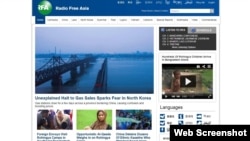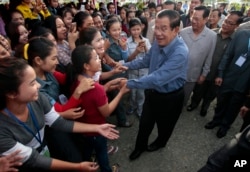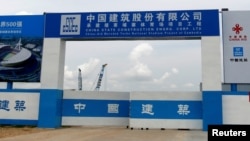Radio Free Asia has joined the ranks of media outlets shuttered under the now almost blanket smothering of an independent press in Cambodia, as U.S. and European diplomatic efforts have failed, so far, to halt the county's descent into authoritarianism ahead of elections next year.
The closure of the U.S.-funded outlet, due to what it called intimidation, represents another escalation in opposition to Washington by Prime Minister Hun Sen.
Conciliatory overtones made in a news conference Tuesday by U.S. Ambassador William Heidt have failed to halt the government's campaign to paint Washington as the masterminds of a vast conspiracy involving all major opponents of the government.
"These are extraordinary allegations. The business of diplomacy is normally carried out with careful and respectful language, the kind of language I'm going to use today. Difficult messages are delivered privately first. Friendly nations seek ways to bridge differences," he told reporters.
Two days later, the government mouthpiece Fresh News posted an article declaring the United States "should take a helicopter to transport its citizens from Cambodia, as it did in April 1975."
Having spent billions of dollars promoting a stable, nominally democratic Cambodia, the United States and the European Union now have only a beleaguered opposition to show for it. The party's leader, Kem Sokha, was arrested this month in connection with Washington's alleged grand plan.
"Basically, after tens of billions of dollars invested in Cambodia, we're back where we were 25 years ago … the more things changed, the more they actually stayed the same," said Sophal Ear, author of Aid Dependence in Cambodia: How Foreign Assistance Undermines Democracy.
China's deep pockets are often cited as an unstoppable force whittling away Western leverage in Cambodia, and Beijing has offered public support for Cambodia's arrest of Sokha.
Returning from China on Wednesday, Hun Sen praised Beijing as "a strong backer who continues to help Cambodia in all circumstance, which no foreign [countries] can break."
But Cambodia's economic entanglements are far more complicated than mere aid contributions, and as tension with Western powers intensifies, drastic measures that would be considered unthinkable under normal circumstances could come into play.
Access to markets
Aid to Cambodia is measured in millions of dollars, but export markets are measured in the billions.
The United States is its biggest individual country export market at $3.5 billion, or 22 percent of the total, according to the Observatory of Economic Complexity (OEC), an online resource for economic data. China accounts for just 4.4 percent.
Cambodia also benefits handsomely from preferential access to European markets, with its exports there rising from just above $595 million in 2006 to about $5.25 billion in 2016 — under a scheme that has both labor and human rights clauses. In comparison, Cambodia has an enormous trade deficit with China of around $3 billion, OEC data show.
The EU has withdrawn a country's access to these markets three times: from Sri Lanka in 2010 for human rights violations carried out during that country's civil war, from Myanmar in 1997 for forced labor and from Belarus in 2007 for failing to respect the basic rights of trade unions.
"What could trigger such a procedure is a serious and systematic violation of one of the listed fundamental human rights or labor rights conventions," an EU spokesperson told VOA.
So while it is true that Chinese foreign investment in and aid to Cambodia increased dramatically — in 2015 its foreign direct investment eclipsed all other countries combined at around $1 billion — the assertion that the West's relationships with Phnom Penh are rendered meaningless as a result is not the full picture.
"The last thing Hun Sen would want would be to provoke the U.S., whether the Congress, White House or U.S. trade representative, to raise Cambodia's market access to the United States. Unrest by textile workers would destabilize the Hun Sen regime and provide grist for the opposition mill," said Carl Thayer, an emeritus professor at the Australian Defence Force Academy.
There are more than 700,000 registered garment workers in Cambodia in an industry heavily reliant on Western markets.
Bigger fish to fry
Some are interpreting new U.S. visa restrictions on Cambodians as a punitive measure. But other than that and the usual statements expressing concern and urging transparency, the response in the West has been muted, especially in Washington.
"I can only surmise that the State Department is in disarray with the new Trump administration, a new secretary of state with little experience in diplomacy, vacancies at the senior level, and impending budget cuts," Thayer said.
"There has been no response by the Trump administration to Hun Sen's cancellation of military exercises with the U.S. earlier this year. Since Trump's Afghanistan speech, in which he nixed nation-building and democracy promotion, who at State will take any initiative against Hun Sen?" Thayer asked.
Trump has also abandoned U.S. participation in one of the State Department's sharpest diplomatic tools in Asia, the Trans-Pacific Partnership trade agreement.
Meanwhile, higher priorities are bountiful, even in Asia.
"Whether we like it or not, Cambodia is not one of the so-called hot spots of global politics. The international community's focus is on countries like Afghanistan, Pakistan or Myanmar," said Barbara Lochbihler, vice chair for the European Parliament's Human Rights Committee.









